 Petzlover
Petzlover Catalan Sheepdog is originated from Spain but Welsh Terrier is originated from United Kingdom. Catalan Sheepdog may grow 16 cm / 7 inches higher than Welsh Terrier. Catalan Sheepdog may weigh 15 kg / 34 pounds more than Welsh Terrier. Both Catalan Sheepdog and Welsh Terrier has same life span. Both Catalan Sheepdog and Welsh Terrier has almost same litter size. Both Catalan Sheepdog and Welsh Terrier requires Moderate Maintenance.
Catalan Sheepdog is originated from Spain but Welsh Terrier is originated from United Kingdom. Catalan Sheepdog may grow 16 cm / 7 inches higher than Welsh Terrier. Catalan Sheepdog may weigh 15 kg / 34 pounds more than Welsh Terrier. Both Catalan Sheepdog and Welsh Terrier has same life span. Both Catalan Sheepdog and Welsh Terrier has almost same litter size. Both Catalan Sheepdog and Welsh Terrier requires Moderate Maintenance.
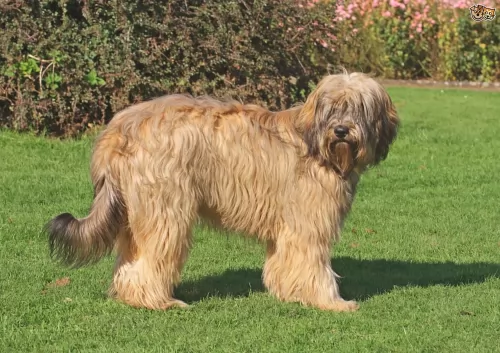 The Catalan Sheepdog, known also as the Gos d’Atura, hails from Catalonia, Spain. It is believed that the dog is related to the Portuguese- and Pyrenean Sheepdogs.
The Catalan Sheepdog, known also as the Gos d’Atura, hails from Catalonia, Spain. It is believed that the dog is related to the Portuguese- and Pyrenean Sheepdogs.
The standard for this breed was formulated in 1929. The sheepdog developed during Roman Empire times between 200 and 100 BC already, being used as livestock guard dogs. With the breed dwindling in the 1970s, Catalonian Sheepdog lovers started promoting it, but it remains a rare breed.
 Originating in Wales and bred to hunt the Welsh Terrier might be the oldest dog breed from the U.K. still in existence today. They were bred to hunt badgers, rodents, and fox. Today however they are mostly bred for show and companionship.
Originating in Wales and bred to hunt the Welsh Terrier might be the oldest dog breed from the U.K. still in existence today. They were bred to hunt badgers, rodents, and fox. Today however they are mostly bred for show and companionship.
There are only two breeds of terrier that are native to the country of Wales, the Welsh and the Black and Tan Rough Terrier. It is believed that the Welsh Terrier was descended from that Black and Tan Rough Terrier in the 18th and 19th centuries. The Welsh Terrier was separated out as a separate breed in the late 1700s.
This breed was hunting with the Otterhounds of Wales and was called a Ynysfor. At the same time their was a breed in England, the Old English Broken Haired Terrier. Both breeds were incredibly alike and once the Ynysfor or Welsh Terrier was recognized by the English Kennel Club in 1886. When shown together they were considered the same breed.
Even though all these dogs from Wales and England were considered to be Welsh Terriers, the breed was not recognized until 1886. It is currently on the list of threatened breeds, with only 300 puppies registered every year. They were the 45th breed to be recognized by the English Kennel Club and the AKC. They are recognized by 14 clubs and registries.
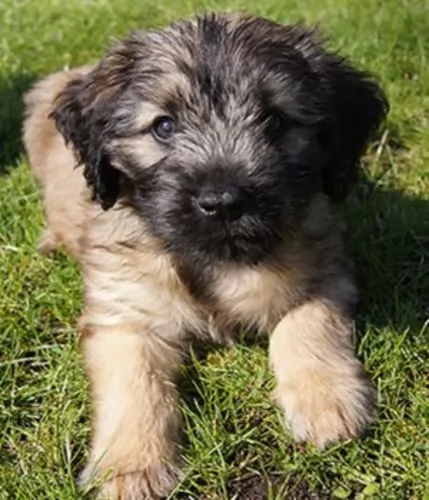 The Catalan is a medium sized dog but gives the impression of being bigger than he actually is. He stands from 45 – 55cm in height and weighs between 20 to 25kg.
The Catalan is a medium sized dog but gives the impression of being bigger than he actually is. He stands from 45 – 55cm in height and weighs between 20 to 25kg.
This breed also has double dew claws on the hind feet. He has a long coat which is slightly wavy and available in different shades such as fawn to brownish to dark grey to black. He has floppy, feathery ears and a fairly long, feathery tail. He has quite a bit of hair on he face too, so you’ll notice a beard, moustache as well as hair which covers the eyes somewhat.
Brave and courageous, the Catalan Sheepdog is also intelligent, active and hardy. He has a round face with a friendly, amicable expression. He is totally pleasant and sweet natured. However, in his role as guardian of sheep he took his role seriously, forming a strong relationship with both shepherd and sheep.
He is wary of strangers. Early socialization and training is always important, and while he makes a wonderful family pet, this training and socialization makes him more relaxed and obedient and he gets on well with children in the home as well as with other pets. While he is a placid, docile and gentle pet, he is also looked upon as a protector, and will defend his family.
 The Welsh Terrier is a medium sized breed that is compact and sturdy. They had docked tails in the past, but the practice is now illegal in the U.K. The dog is about as long as it is tall. The head and face are elongated with a beard and whiskers. Females are smaller than males, but both are compact and sturdy.
The Welsh Terrier is a medium sized breed that is compact and sturdy. They had docked tails in the past, but the practice is now illegal in the U.K. The dog is about as long as it is tall. The head and face are elongated with a beard and whiskers. Females are smaller than males, but both are compact and sturdy.
Eyes are almond shaped, dark brown and small. The ears are small and V shaped. They should not be thin. The muzzle is square and strong with a black nose. The lips are tight and they are also black.
They have a double coat with is rugged and wiry on top and the undercoat is insulative and softer. The coat is waterproof and protects from wind and dirt as well. The puppies are all black until about 9 months when they become black and tan. The legs, head and underbelly are tan, with a black saddle.
The Welsh Terrier has wiry hair on the legs, muzzle and quarters. The hair is very dense in the top coat. Their gait and movement is straight, effortless and free.
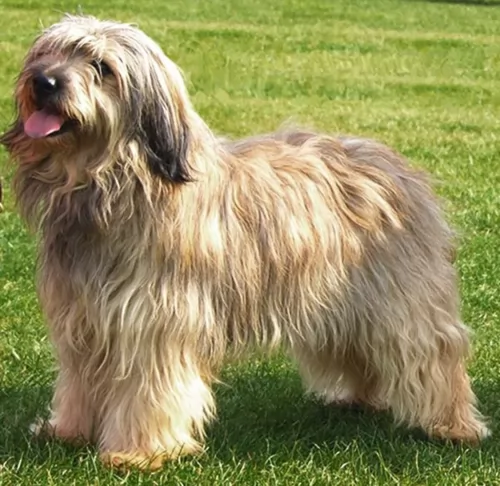 The Catalan Sheepdog is such an amicable character – he is going to make an awesome pet. He is an intelligent and obedient dog and is easily trained.
The Catalan Sheepdog is such an amicable character – he is going to make an awesome pet. He is an intelligent and obedient dog and is easily trained.
He has been used for guarding- and herding work and as a family pet makes a excellent guard dog as well. Capable of being gentle too, he is everything his human family wants him to be and just becomes a regular member of the family.
 1Children friendliness – The Welsh Terrier is good with kids and will follow them anywhere. They do want to play with the children by tugging on them and could cause a young child to fall. They can learn to play gently with small children.
1Children friendliness – The Welsh Terrier is good with kids and will follow them anywhere. They do want to play with the children by tugging on them and could cause a young child to fall. They can learn to play gently with small children.
3.Adaptability – They do fine in smaller indoor spaces as long as they have a robust exercise routine daily. They will be active indoors.
4.Learning ability -They are very smart, independent thinkers as can been seen by their ability to learn to play gently with small children. They need plenty of socialization early in life
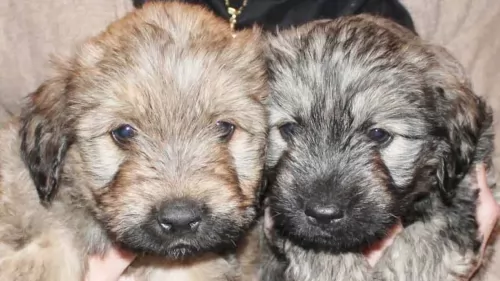 The Catalan Sheepdog is a fairly healthy breed and has a life expectancy of 12, 13 or 14 years. Nonetheless you will still need to watch out with common dog ailments with him, particularly hip dysplasia.
The Catalan Sheepdog is a fairly healthy breed and has a life expectancy of 12, 13 or 14 years. Nonetheless you will still need to watch out with common dog ailments with him, particularly hip dysplasia.
This is a joint and hip disease which can start with symptoms from 6 months of age already. Your dog will be hesitant to play and jump, doesn’t like to go upstairs, tires easily during a walk and develops a hop-like way to walk. You’ll notice that when he lies down, he battles to- or is reluctant to get up again.
X-rays may be required to confirm the diagnosis of hip dysplasia. There are different treatment options, all with the wellbeing of your pet in mind. You don’t want him to have a life of pain and lameness.
 The Welsh Terrier is a fairly healthy hunting dog, though they do have some health issues.
The Welsh Terrier is a fairly healthy hunting dog, though they do have some health issues.
• Onychodystrophy – Nails grow weak and are very brittle. They can break easily and cause pain, irritation and even infections.
• Primary lens luxation – causes secondary glaucoma which can cause blindness.
• If hunting, they are exposed to hunting injuries and should be checked over well after a field adventure, whether hunting or in field trials.
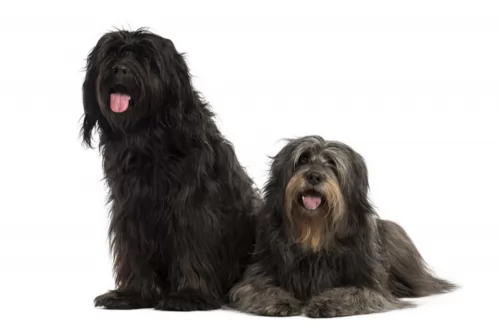 The Catalan Sheepdog is a working breed, so he is going to need plenty of exercise. While he adapts easily to city- or country life, it will be to his benefit to have a garden to romp in. You will still need to take him for walks and play ball- and rope games with him. This will prevent boredom and destructive behavior from him.
The Catalan Sheepdog is a working breed, so he is going to need plenty of exercise. While he adapts easily to city- or country life, it will be to his benefit to have a garden to romp in. You will still need to take him for walks and play ball- and rope games with him. This will prevent boredom and destructive behavior from him.
The Catalan Sheepdog has long hair so he will need to be brushed twice a week to avoid matting. This will help to remove loose hair too, but also distribute natural oils through his coat, keeping his hair and skin healthy and free from skin rashes and itchiness.
This brushing ensures other benefits as you can simultaneously check him for parasites such as fleas and ticks.
If you feed him commercial dog food, make sure its a high quality one. He is an active breed so will require high protein. Give him some homemade rice, vegetables and meat, and include raw meat in his food from time to time too. Always ensure that there is fresh, cool water constantly within reach.
 1.Feeding the puppy – the breed is prone towards obesity so do not overfeed wither the puppy or the adult. Watch the calorie level and make sure they get high quality, high protein feed meant for the breed or for medium sized dogs. Feed the puppies small amount 3-4 times per day.
1.Feeding the puppy – the breed is prone towards obesity so do not overfeed wither the puppy or the adult. Watch the calorie level and make sure they get high quality, high protein feed meant for the breed or for medium sized dogs. Feed the puppies small amount 3-4 times per day.
2.Feeding the adult - the breed is prone towards obesity so do not overfeed wither the puppy or the adult. Watch the calorie level and make sure they get high quality, high protein feed meant for the breed or for medium sized dogs. Feed the adult at least 2 times per day.
4. Games and Exercises Full of energy and requiring a routine outlet for that energy, the Welsh Terrier is an active dog. Just running around a fenced yard all day will not be enough physical and mental stimulation for them. If bored they can get into trouble. They need a job or a challenge. They love to swim and they love to chase. They do well in agility, field trials and barnhunt.